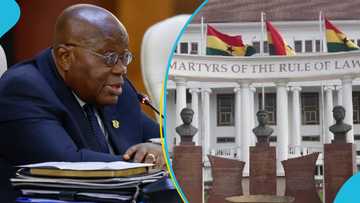Supreme Court Upholds Unnatural Carnal Knowledge Law Challenged By University of Ghana lecturer
- The Supreme Court has upheld the law in the Criminal Offences Act, which prohibits unnatural carnal knowledge
- Dr Obiri-Korang, a University of Ghana lecturer, challenged the unnatural carnal knowledge law
- The whole reasoning for the unanimous decision on July 24, has not been made public by the court
The Supreme Court has upheld the law which prohibits unnatural carnal knowledge.
The court dismissed the legal challenge of the law in Section 104 (1) (b) of the Criminal Offences Act, 1960 (Act 29) brought by one Dr Obiri-Korang, a University of Ghana lecturer.

Source: Getty Images
The court has not made the full reasoning for the unanimous decision on July 24, public.
Graphic Online reported that the full ruling will be deposited at the court registry later.
PAY ATTENTION: Click “See First” under the “Following” tab to see YEN.com.gh News on your News Feed!

Read also
"Our court system is overburdened": Akufo-Addo defends his appointment of additional judges
Section 104 (1) (b) of Act 29 makes it a crime for any person to have unnatural carnal knowledge of a person who is 16 years and above, even with his consent, with the crime described as a misdemeanour.
Section 104 (2) defines unnatural carnal knowledge as sex in an unnatural way or with an animal.
Obiri-Korang argued that Section 104(1)(b) of the Act was unconstitutional because it breached the right to privacy stipulated under Article 18 of the 1992 Constitution, the right against discrimination under Article 17, and the protection of personal liberties under Article 14.
Fight to protect sexual rights
Obiri-Korang's case was one of the four cases related to sexuality being heard by courts.
The other cases include suits filed by Dr Amanda Odoi, Richard Sky, and Paul Boama-Sefa at the Supreme Court.
They are challenging the Human Sexual Rights and Family Values Bill, known as the "anti-LGBTQ" bill.
Akufo-Addo refuses to receive “anti-LQBTQ” bill
President Akufo-Addo has refused to formally receive the Human Sexual Rights and Family Values Bill, which Parliament approved on June 28.
Eight MPs pushed the bill, which the president returned to Parliament when sent for his assent.
The court refused to compel him, noting that granting such a request would be inappropriate because of the bill's legal challenges at the Supreme Court.
The non-receipt of the bill by the presidency since it was passed has been frustrating for some figures in the legislature.
Almost 60% of voters are in favour of an “anti-LGBTQ bill”
YEN.com.gh reported that 59 percent of Ghanaian voters favour the Human Sexual Rights and Family Values Bill, according to a Global Info Analytics survey.
According to data, 37 percent said the president's non-assent would influence their voting decision.
Six thousand one hundred twenty-eight voters were interviewed for the survey, of which 5,928 responded to questions about who they intended to vote in the December 2024 elections.
Proofread by Berlinda Entsie, journalist and copy editor at YEN.com.gh
PAY ATTENTION: Stay informed and follow us on Google News!
Source: YEN.com.gh


